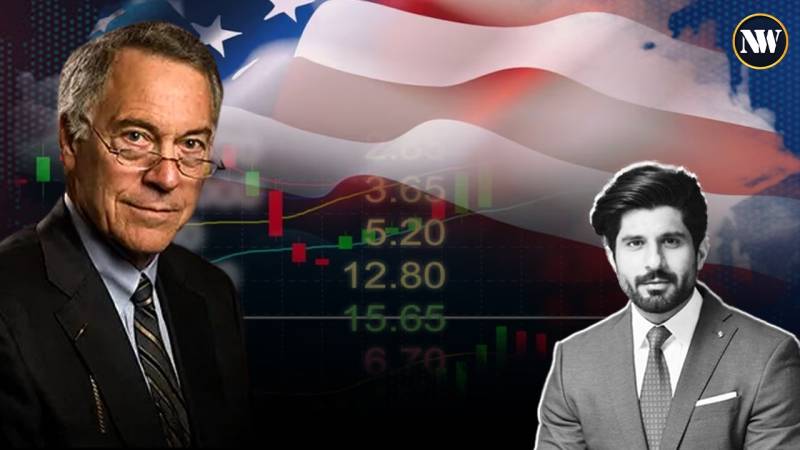In a recent discussion with economist Professor Steve Hanke, hosted by Nauraiz Rana, a comprehensive analysis of the United States' economic performance throughout 2023 and the anticipated challenges in 2024 unfolded. Professor Hanke, a distinguished economist known for his work on the quantity theory of money, collaborated with John Greenwood to dissect the intricacies of inflation, policy decisions, and the looming specter of a recession.
The conversation commenced with a focus on the quantity theory of money, a methodological framework with roots dating back to the 16th century. Professor Hanke emphasized the historical significance of this approach, asserting that changes in the money supply act as the engine driving economic activity. The deviation from this theory by major central banks, such as the Federal Reserve, raises questions about the effectiveness of contemporary monetary policies. This re-emergence of the quantity theory of money prompts contemplation on the reconsideration of traditional economic principles.
The resurgence of the quantity theory of money underscores the importance of revisiting proven methodologies. Professor Hanke's assertion that changes in the money supply strongly correlate with changes in prices provides a foundational understanding of economic trends. As policymakers grapple with managing economic fluctuations, this discussion urges a reevaluation of the principles guiding monetary policy decisions.
A significant part of the discussion revolved around the trajectory of inflation in the United States. The interview shed light on the substantial increase in the money supply in 2021, leading to a 40-year high in inflation at 9.1%. Professor Hanke's emphasis on predicting this inflationary surge using the quantity theory of money underscores the predictive power of this methodology. However, the subsequent contraction in the money supply since March 2022 serves as a red flag, indicating an impending recession.
An exploration of these economic indicators prompts contemplation about the delicate balance required in managing inflation and economic growth. in many ways the inflationary spike may have been a consequence of an overly ambitious increase in the money supply, leading to a subsequent contraction to mitigate inflation. This prompts a crucial question for policymakers – how can they strike a balance that ensures stable economic growth without succumbing to the pitfalls of inflation?
Looking ahead, Professor Hanke and John Greenwood predict a recession in the United States in 2024. The forecast is rooted in the lagging nature of the labor market, where layoffs, reduced overtime, and heightened economic anxiety are anticipated. The discussion provides a detailed examination of how economic indicators, particularly the money supply, serve as leading indicators of economic downturns.
The inevitability of a recession raises critical questions about the readiness of policymakers to navigate such challenges. Professor Hanke's recommendation to halt quantitative tightening and reduce interest rates serves as a potential course correction. However, the discussion also highlights the challenge of reversing policies once they are set in motion. This anticipation of a recession serves as a wake-up call for policymakers to adopt proactive measures and rethink their strategies for sustaining economic stability.
The interview expands its scope to include the psychological aspects of economic dynamics. Drawing on theories from the Cambridge School, Professor Hanke underscores the role of confidence in shaping economic cycles. The China example further accentuates the impact of low confidence on economic struggles, despite a growing money supply. This discussion prompts a deeper reflection on the interconnectedness of economic indicators and the human psychology that influences economic decision-making.
Understanding the psychological underpinnings of economic behavior is crucial for policymakers seeking to anticipate and mitigate economic downturns. The interview suggests that beyond quantitative indicators, confidence levels among businesses and consumers play a pivotal role in shaping economic trajectories. Policymakers may need to consider measures that not only address economic indicators but also boost confidence to stimulate economic recovery.
Professor Hanke's policy recommendations provide actionable insights for mitigating the impact of the impending recession. The immediate halt to quantitative tightening, coupled with a reduction in interest rates, is proposed as a means to stabilize the economy. The call to ease bank regulations further underscores the need to create a conducive environment for financial institutions to play their role in economic recovery.
Additionally, these policy recommendations resonate with the notion that timely and well-calibrated policy adjustments can influence the course of economic events. The urgency conveyed in Professor Hanke's suggestions emphasizes the need for nimble and responsive policymaking. However, the interview also acknowledges the challenges associated with policy reversals, highlighting the delicate balancing act required by policymakers.
Professor Hanke urges policymakers to reevaluate their approaches, draw from time-tested methodologies, and adopt proactive measures to navigate the uncertainties that lie ahead. He also encourages the broader public to engage in informed conversations about economic dynamics, fostering a deeper understanding of the factors that shape their financial well-being. As we move into a new year, armed with these insights, it is imperative to approach economic challenges with a blend of caution, preparedness, and a commitment to fostering resilience in the face of uncertainties.

